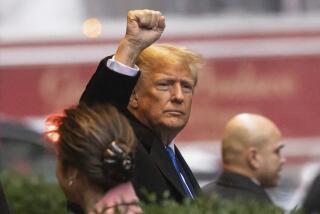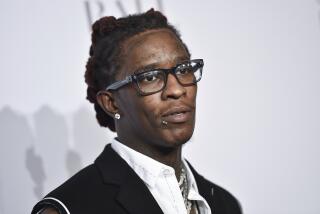Deliberations in Trial of Grocer Interrupted for Ruling on Dispute : Courts: Two jurors were overheard arguing in a hallway. But the judge says the panel has not been compromised.
- Share via
Deliberations in the trial of a Korean-American grocer accused of killing a black teen-ager were delayed several hours Wednesday as a judge decided whether a hallway argument between two jurors was improper.
Superior Court Judge Joyce A. Karlin decided that the jurors had done nothing wrong and that deliberations in the murder trial of Soon Ja Du in the shooting of 15-year-old Latasha Harlins at a South-Central Los Angeles liquor store had not been jeopardized.
The incident came to light when journalist Itabari Njeri, a Los Angeles Times reporter on leave from the newspaper while working on a book that deals with the trial, delivered a letter to the judge Wednesday morning describing the jurors’ hallway discussion, which she had overheard. Times reporter Andrea Ford, who has covered the trial for the newspaper, also overheard the jurors’ remarks.
The jury had been instructed not to talk about the case outside the courtroom. Standard court rules prohibit jurors from discussing the merits of a case unless all 12 jurors are present.
“The court is not convinced that there has been any improper discussion by any of the jurors in this case outside the jury room,” Karlin said. “The court is convinced that the integrity of the jury deliberation process has not been compromised and therefore there is no reason to substitute alternate jurors at this time.”
Before her ruling, Karlin summoned Ford to an in-chambers hearing.
Attorney Rex S. Heinke of the law firm of Gibson, Dunn & Crutcher, representing The Times, invoked the state shield law that protects reporters from revealing unpublished information. But Karlin ruled that Ford’s right to invoke the shield law was waived when she discussed the incident with Njeri.
On advice of counsel, Ford briefly testified, essentially confirming what was in Njeri’s letter.
Ford later said she had heard two male jurors arguing loudly at the end of a corridor outside Karlin’s courtroom.
“I heard the words involuntary manslaughter and manslaughter, “ Ford said, referring to two of the charges the jury is considering against Du. “I also heard one of them say, ‘It’s hard to convince a jury that she thought that gun would fire if she shook it. That’s insulting to my intelligence.’ ”
Njeri’s letter gave a similar account. She said she sent the letter because she thought it was her civic duty and because she was going to describe the incident in her book.
Jury deliberations began after Karlin’s ruling, but the jury retired for the day without issuing a verdict.
More to Read
Sign up for Essential California
The most important California stories and recommendations in your inbox every morning.
You may occasionally receive promotional content from the Los Angeles Times.










